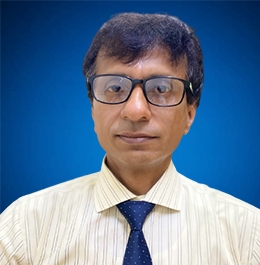Dr. Ram Chand
Associate Professor
Department of Natural Sciences
Contact Details ram.chand@bnbwu.edu.pk
Biography
Dr. Ram Chand has obtained his M.Sc. in Physics from University of Sindh, Jamshoro and PhD in Physics from Beijing Institute of Technology, Beijing, China.
His major research fields are soft condensed matter physics, soft matter physics and computational physics. Dr. Ram Chand has published more than 20 international research papers in HEC approved Journals.
His other teaching and research interests include SUSY, CP-violation, Spontaneous Symmetry Breaking in Particle Physics, Quantum Field Theory and Classical Physics.
Dr. Ram C has acquired following skills till now:
Experimental Skills: Doping and co-doping of thin films, growth of dielectric material using RF sputtering and investigation of deposited material by XRD and XPS techniques; Granular flow, microfluidic channel flow, static granular piling, segregation and avalanche phenomena in particles.
Characterization techniques and skills: Dynamic Light Scattering (DLS) technique for probing granular flow, X-Ray, Photoelectron Spectroscopy (XPS) using PHI Quantera SXM spectrometer, Use of HP 4294A LCR meter, X-ray diffraction, High speed camera monitoring, etc.
Simulation Skills: Discrete Element Method (DEM), Computational Fluid Dynamics (CFD) and coupled DEM-CFD and DEM-MBD.
Computational Skills: Origin, C++/C#, Matlab, Python, LAMMPS, LIGGGHTS, EDEM, Star CCM+, LMGC90, Blender and SolidWorks.
Qualifications
| Degree | From | Major | Year |
|---|---|---|---|
| Ph.D | Beijing Institute of Technology, China | Physics | 2012 |
| MSc | University of Sindh, Jamshoro | Physics | 2000 |
| BSc | University of Sindh, Jamshoro | Physics | 1999 |
Publications
| # | Titles | Author(s) | Year |
|---|---|---|---|
| 1 | Estimation of a trend of meteorological and hydrological drought over Qinhuai River Basin | Mohammad Ilyas Abro, Ehsan Elahi, Ram Chand | 2022 |
| 2 | Green Synthesis of Ag2S/ZnS Composites and Their Application for Seeds Germination to Explore Critical Aspect | Tahir Iqbal, Khudija Munir, Sumera Afsheen, Maria Zafar, M. Abrar, Muhammad Tauseef Qureshi, Mahmoud Al Elaimi, Reda Abdel Hameed, Ram Chand | 2022 |
| 3 | Evaluating the effectiveness of eggshells to remove heavy metals from wastewater | MA Khaskheli, MI Abro, R Chand, E Elahi, FM Khokhar, AA Majidano, ... DESALINATION AND WATER TREATMENT 216, 239-245 |
2021 |
| 4 | Calculating photon buildup factors in determining the γ-ray shielding effectiveness of some materials susceptible to be used for the conception of neutrons and γ-ray shielding | NNorah AM Alsaif, Youssef Elmahroug, BM Alotaibi, Haifa A Alyousef, Najeh Rekik, A Wahab MA Hussein, R Chand, Umer Farooq Journal of Materials Research and Technology 11, 769-784 |
2021 |
| 5 | Confirming the SERS enhancement at large mapping area using self-assembly of silver nanocube at liquid-liquid cyclohexane/water interface | SB Jamali, MA Khaskheli, MI Abro, R Chand, N Rekik, H Affan, R Ikram Journal of Molecular Liquids 326, 115365 |
2021 |
| 6 | A unified quantum model susceptible to elucidate the dissimilarity of IR spectral density of dicarboxylic acid crystals: Phthalic and terephthalic acid crystals cases | N Rekik, NAM Alsaif, HT Flakus, U Farooq, R Chand Spectrochimica Acta Part A: Molecular and Biomolecular Spectroscopy 242, 118728 |
2020 |
| 7 | Numerical Simulations on Mixing Dynamics of Spherical and Non-Spherical Tablets in a Pan Coater | R Chand, RH Lajimi, S Uddin, S Meghwar, U Farooq, N Rekik Engineering, Technology & Applied Science Research 9 (6), 5029-5032 |
2019 |
| 8 | Fractal Analysis of Light Scattering Data from Gravity-Driven Granular Flows | R Chand | 2019 |
| 9 | Fractal Analysis of Light Scattering Data from Gravity-Driven Granular Flows," IJCSNS International Journal of Computer Science and Network Security | R Chand, MA Saeeduddin Saleem, WA Bhutto, AH Nizamani, MY Soomro, NM Shaikh, SV Muniandy," Fractal … | 2019 |
| 10 | Discrete element method study of shear-driven granular segregation in a slowly rotating horizontal drum | R Chand, SV Muniandy, C San Wong, J Singh Particuology 32, 89-94 |
2017 |
| 11 | “Buoyancy” in granular medium: How deep can an object sink in sand? | Y Sandali, R Chand, Q Shi Physica A: Statistical Mechanics and its Applications 451, 560-564 |
2016 |
| 12 | Experimental and numerical determination of apparent mass variation of granular media confined in silo geometry | A Qadir, NA Ispalove, A Ali, R Chand, MA Shah, A Khan, K Hussain | 2016 |
| 13 | Influence of spontaneous percolation on apparent mass at the bottom of a Janssen granular column | R Chand, MA Khaskheli, A Qadir, Y Sandali, Q Shi Physica A: Statistical Mechanics and its Applications 393, 96-100 |
2014 |
| 14 | The nature of stresses in a giant static granular column | G Bao-Liang, S Qing-Fan, R Chand, H Jian-Feng, M Shao-Peng Chinese Physics Letters 30 (4), 048101 |
2013 |
| 15 | Structural and dielectric properties of Ti and Er co-doped HfO2 gate dielectrics grown by RF sputtering | MA Khaskheli, P Wu, R Chand, X Li, H Wang, S Zhang, S Chen, Y Pei Applied surface science 266, 355-359 |
2013 |
| 16 | Discrete particle simulation of radial segregation in horizontally rotating drum: Effects of drum-length and non-rotating end-plates | R Chand, MA Khaskheli, A Qadir, B Ge, Q Shi Physica A: Statistical Mechanics and its Applications 391 (20), 4590-4596 |
2012 |
| 17 | Fluctuations in apparent mass at the bottom of granular columns due to different arrangements | R Chand, Q Shi, A Qadir, S Ma, G Sun Physica A: Statistical Mechanics and its Applications 391 (10), 2936-2939 |
2012 |
| 18 | Phase Transition in Quasi-Two-Dimensional Horizontally Driven Granular System | SH Shah, Y Li, WS Khan, NA Din, R Chand Acta Physica Polonica-Series A General Physics 121 (3), 699 |
2012 |
| 19 | Anomalous increase of apparent mass in a silo due to percolation | R Chand, A Qadir, S Qing-Fan, Z Ning, S GangChinese Physics Letters 28 (9), 098301 | 2011 |
| 20 | Effects of Moving Side Walls on Confined Granular Packings | R Chand, ZA Memon, A Qadir Mehran University Research Journal of Engineering & Technology 30 (3), 411-416 |
2011 |
| 21 | Article Information Effects of Moving Side Walls on Confined Granular Packings | R Chand, ZA Memon, A Qadir Mehran University Research Journal of Engineering & Technology 30 (3) |
2009 |
| 22 | Experimental study of effective mass and fluctuations of different granular arrangements in a silo | A Qadir, MA Shaikh, R Chand Mehran Univ. Research Journal of Engineering and Technology (Pakistan) |
2009 |

